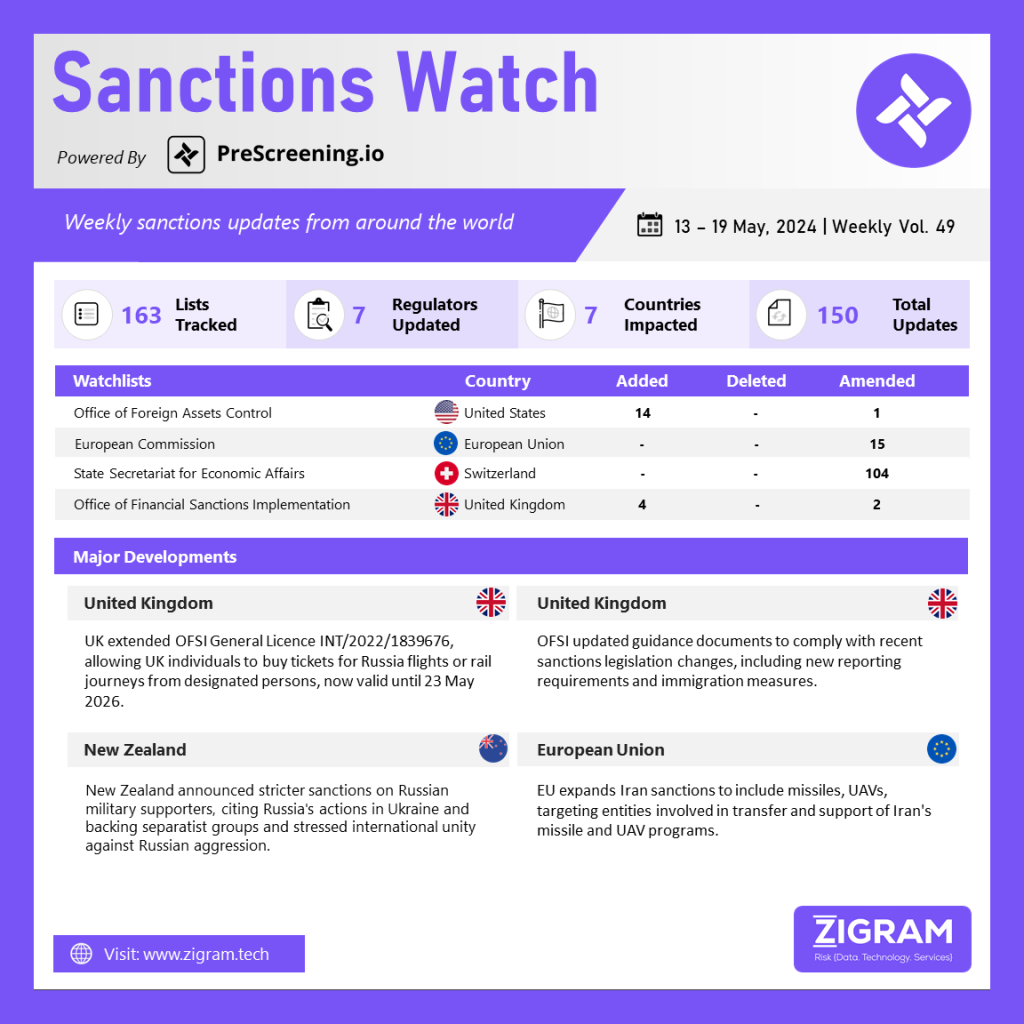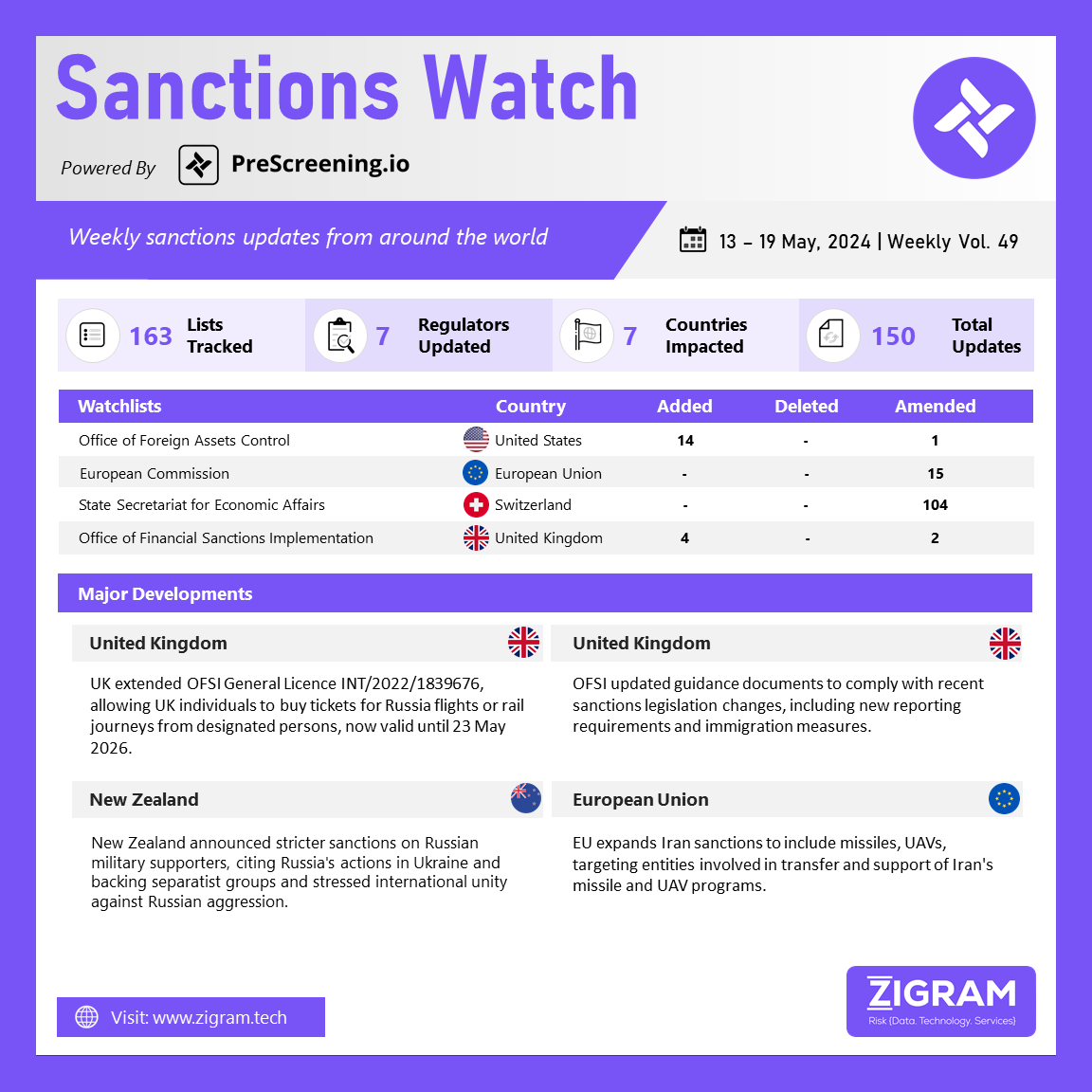Published Date:
In the latest edition of our Sanctions Watch weekly digest, we present significant updates on sanction watchlists and regulatory developments.
On May 16, 2024, the UK Government prolonged the validity of OFSI General Licence INT/2022/1839676, which includes the authorization for UK individuals to procure tickets for flights or rail travels commencing from, or within, Russia, specifically from designated entities. This extension grants continuation of the general license until May 23, 2026. The decision to extend the license reflects the ongoing diplomatic considerations and regulatory frameworks between the UK and Russia. By extending the authorization period, the government aims to maintain a structured approach towards facilitating essential travel arrangements while concurrently adhering to established compliance measures and international obligations. The extension underscores the complexities of managing bilateral relations amidst geopolitical dynamics and underscores the importance of regulatory clarity in facilitating lawful transactions and movements across international borders.
OFSI updated its General, Russia, Counter-Terrorism and Enforcement & Monetary Penalties guidance documents to reflect sanctions legislation changes introduced through the Sanctions (EU Exit) (Miscellaneous Amendments and Revocations) Regulations 2024 and the Sanctions (EU Exit) (Miscellaneous Amendments) Regulations 2024, both laid in Parliament on 15 May 2024. New additions include a reporting requirement on designated persons under Regulation 38A of the Republic of Belarus (Sanctions) (EU Exit) Regulations 2019 and new immigration measures under Regulation 5 of the Counter-Terrorism (Sanctions) (EU Exit) Regulations 2019, effective from 5 June 2024. OFSI also updated its financial sanctions general guidance to include references for the inclusion of designated persons subject to the reporting requirements in Regulation 38A of the Belarus Regulations and monetary penalties for breaches of reporting obligations.
Foreign Minister and Deputy Prime Minister Winston Peters recently announced New Zealand’s implementation of stricter sanctions against individuals and organizations supporting Russia’s military endeavors. These measures, unveiled on May 16, 2024, are a direct response to Russia’s ongoing aggression in Ukraine. The sanctions, part of a broader effort to uphold Ukraine’s territorial integrity and sovereignty, target 28 individuals and 14 organizations aiding Russia militarily and strategically. The sanctions aim to hold accountable those involved in actions such as the forced relocation of Ukrainian children and the facilitation of weapons transit from North Korea and Iran to Russia. Peters emphasized that Russia’s military aggression, supported by its military-industrial complex, undermines Ukraine’s sovereignty and territorial integrity. New Zealand unequivocally condemns all entities and individuals providing such military support, affirming its commitment to international peace and security.
The EU has expanded its Iran sanctions framework to target Iran’s military support for Russia. These measures, implemented in July 2023, currently forbid the export of components used in constructing and producing Unmanned Aerial Vehicles (UAVs) from the EU to Iran. They also include targeted sanctions on individuals and entities deemed responsible for, supporting, or involved in Iran’s UAV program. The sanctions now extend to missiles in addition to UAVs, encompassing individuals and entities engaged in supplying, selling, or otherwise facilitating the transfer of Iran’s missiles and UAVs.
- #OFAC
- #UnitedKingdom
- #GeneralLicence
- #DesignatedPersons
- #Russia
- #TravelArrangements
- #Enforcement
- #MonetaryPenalties
- #CounterTerrorism
- #Belarus
- #SanctionsWatch
- #RegulatoryCompliance
- #TradeCompliance
- #SanctionsEnforcement
- #SanctionsMonitoringBoard
- #RegulatoryObligations
- #SanctionsBreaches
- #NewZealand
- #Ukraine
- #MilitaryAggression
- #Iran
- #UnmannedAerialVehicles
- #UAVs


